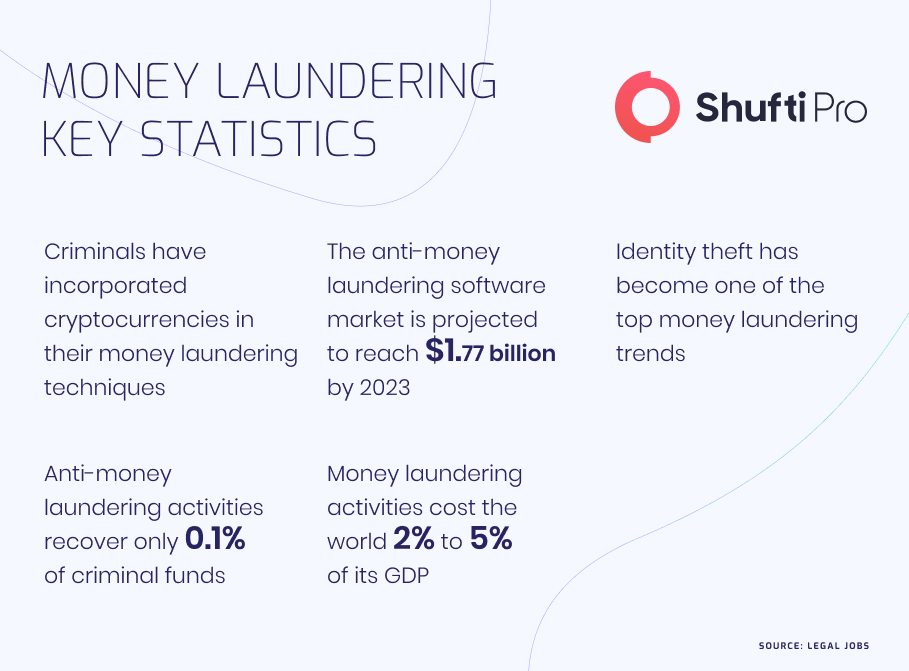Securing Banks and Curbing Financial Crimes with Shufti AML/KYC Solution

Banks and other financial institutions constantly face the challenges of tackling financial crimes to comply with international AML regulations and standards. Global financial regulators are developing new regulations to identify and fill in the loopholes in the financial systems. At the same time, financial criminals come up with sophisticated techniques to bypass security checks and succeed in their illicit motives.
Regulatory authorities regularly urge financial institutions to implement a risk-based approach to prevent financial crime as well as ensuring compliance with AML regulations. Every year, the global financial sector spends around 180.9 billion in compliance costs.
Financial Industry and Prevailing Crimes
Banks and businesses operating in the financial sector are most vulnerable to becoming the sources of money laundering in the absence of fraud prevention measures. Financial firms that do not implement AML measures as per regulations are no different from real estate firms or the art industry, which account for the laundering of large amounts of money every year.
Many countries and jurisdictions around the world have set up organizations for the sole purpose of combating financial crimes like money laundering and terrorist financing. The US has the Financial Crimes Enforcement Network (FinCEN). Similarly, the UK has the Financial Conduct Authority (FCA), Germany has the Federal Financial Supervisory Authority (BaFin), and France has the Financial Markets Regulator (AMF).
Money laundering and terrorist financing are crimes that fall under predicate offences, as they involve criminal proceeds that are converted into legal money and introduced into the global financial system. As criminals adopt new and advanced methods to obscure the origins of their ill-gotten funds, regulatory bodies have tightened the regulations to identify and counter the risks of financial crime. As a result, new Anti-Money Laundering (AML) and Counter-Financing of Terrorism (CFT) legislation have been introduced and non-compliance penalties have been raised.
How Financial Criminals Evade Security Checks
Considering the consequences of getting caught for money laundering, financial criminals adopt various methods and channels to move and hide their dirty money. Criminals look for weak points not only in financial institutions but also in countries and jurisdictions to find the easy way out. As AML regimes of countries and jurisdictions vary, money launderers look for safe havens to stash their illegally-obtained funds. They move their money through physical or electronic means in order to avoid stringent AML checks.
In high-risk jurisdictions that have weak AML regimes, financial crimes begin with identity fraud. Money launderers usually hide their real identities while using a financial institution to deposit or transfer their dirty money. Identity fraud allows financial criminals to take advantage of the financial system as they can remain anonymous while making online transactions. That’s not all, money launderers also divide their transactions into patterns in order to avoid raising suspicion. They transact through different financial institutions and keep the amounts below the threshold amounts to stay undetected.
Furthermore, money laundering and other financial crimes also involve corrupt political entities like government officials. These types of money launderers exploit their status and power to move and clean the money obtained from corruption. Not just Politically Exposed Persons (PEPs) themselves, but their relatives and anyone in their circle can be a potential red flag for money laundering. Financial criminals also make use of third parties or money mules to move and hide the origins of their money. They usually use highly vulnerable or financially weak entities as money mules.

China’s Central Bank Fines ICBC & Bank of Chongqing for AML Shortcomings
Money laundering offences usually have adverse effects on financial institutions like banks that unwantedly become the source of such crimes. In one such case, China’s Central Bank recently fined the ICBC and the Bank of Chongqing for inadequate AML controls. There were more than 60 allegations against both banks, but the main reason why the Bank of Chongqing was fined was the insufficient AML controls in financial dealings.
China’s banking sector was collectively fined a total of CNY44.5 million (6.6 million USD). Penalties imposed on individuals also exceeded the 1 million CNY (149,300 USD). All in all, the People’s Bank of China charged over 365 banks and financial institutions with a total amount of CNY 261 million (39 million USD).
The recent AML violations led the banks and other financial departments of China to get fined. For instance, the Chongqing department of the Central Bank of China imposed a massive fine of CNY 6 million (895800 USD) on the local branch of ICBC (Industrial and Commercial Bank of China) for failing to assure client identities and submitting audit reports on large and suspicious transactions as required.
How Banks Can Safeguard Operations
Money launderers and terrorist financing groups are using sophisticated techniques and tech-driven tools, making it quite hard for the financial firms and regulatory authorities to determine the instance of crimes. Financial crimes involve an international element since criminals need to route their illicit earnings to facilitate their plans. To do so, money launderers and other criminals utilize passages passing through high-risk countries, having connections with politically exposed persons in the government of law enforcement departments.
Therefore, banks, financial firms, and other businesses dealing with the transaction are required to comply with local as well as international Anti-Money Laundering (AML) and Combating the Financing of Terrorism (AML/CFT) regulations like the Bank Secrecy Act (BSA) of the US, the UK’s Proceeds of Crime Act (POCA) and the EU’s AML Directives. Additionally, many governments across major jurisdictions have developed in-house AML/CFT frameworks that are aligned with the standards set out by the Financial Action Task Force (FATF), the most prominent regulatory authority making efforts to eradicate the roots of money laundering and terrorist financing activities.
Anti-money laundering laws are systematically designed to secure businesses from known or unknown money laundering or terrorist financing attempts. However, the severity as well standards may vary by country, but everyone has some common attributes including implementing record-keeping and developing and integrating a risk-based approach as per FATF’s recommendations.
To stay put, companies must develop and implement in-house AML/CFT regulatory systems. However, the risk-based approach depends on how Know Your Customer (KYC) checks are being practiced. KYC measures enable businesses to gather and verify personally identifiable information along with clients’ documents, which helps to determine true identities, understand the nature of transactions, and identify suspicious activities. In addition to this, in case banks or other financial firms detect money laundering activities, they are required to inform the country’s financial regulators instantly by filing and submitting a suspicious activity report.
1. Due Diligence Checks: Banks need to develop a customer identification program that can effectively verify the real identities of clients along with beneficial owners. However, high-risk entities are subject to enhance due diligence measures as they are exposed to money laundering and terrorist financing crimes.
2. Transaction Monitoring: Financial institutions need to monitor clients’ transactions that appear suspicious or linked with money laundering proceedings. Additional, large transactions, or funding that does not match with respective customers, represent financial crime red flags.
3. Background Screening: businesses need to ensure that they are not becoming part of a money-laundering scheme or facilitating high-risk entities that are enlisted in financial crime databases, sanctions, PEPs lists and watchlists.
How Shufti Can Help
Shufti is an all-in-all AML/KYC solution that can help financial institutions, particularly banks to remain compliant with regulatory obligations as well as can identify the instance of money laundering before it happens. Powered by thousands of AI algorithms, Shufti’s AML screening solution also screens customers against 1700+ global watchlists in less than a second with 98.67% accuracy.
Want to learn more about AML/KYC Compliance for financial firms?

 Explore Now
Explore Now













